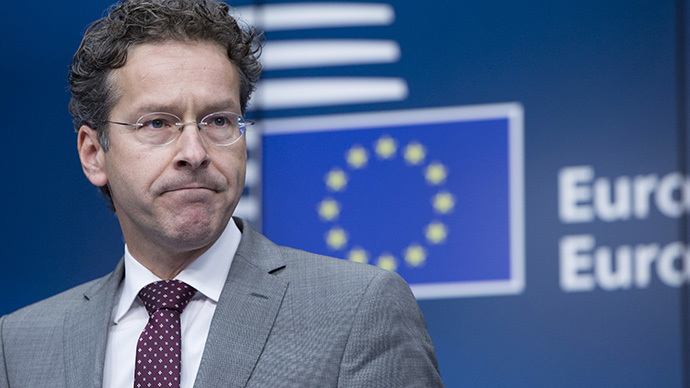Greek debt crisis: Eurogroup shifting towards 'Plan B'

The Europgroup is now focusing on Plan B over Greece’s default and possible exit from the euro, as Athens has rejected the latest creditors’ proposals and is going for a referendum on the issue.
Prime Minister Alexis Tsipras’ decision to hold a referendum caused a wave of criticism and discontent from the eurozone finance ministers, who now see no sense in further bailout talks and plan to focus on Plan B, and dealing with the consequences of the potential Greek default.
Jeroen Dijsselbloem, the Eurogroup president, told reporters before the emergency meeting in Brussels that he is “very negatively surprised” by the Greek government’s decision to reject the last proposals from the creditors and to hold a referendum instead. He called it “a sad decision” as it “closed the doors on future talks” and said, the Eurogroup would “talk about future consequences.”
German Finance Minister Wolfgang Schaeuble said the Greek government’s call for a referendum means an end to the negotiations as “there is no more basis for it,” AP reported.
According to Reuters, Germany admitted that there was little the Eurogroup could do at the moment, as there was nothing left to discuss except how to cope with the failure.
"Clearly we can never rule out surprises with Greece, so there can always be hope. But none of my colleagues with whom I've already spoken see any possibilities for what we can now do," Wolfgang Schaeuble said as quoted by Reuters.
He added that the bailout program for Greece ends on Tuesday, as “Greece has left the negotiating table… and there are no more negotiations.”
Breaking: the full eurogroup statement on #Greece. Note the footnote: http://t.co/jJpAZaGshspic.twitter.com/AHp0cjfEJt
— Ed Conway (@EdConwaySky) June 27, 2015
Edward Scicluna, Malta’s finance minister, said Greece had decided to hold a referendum at the most undesirable moment, TASS reports. “Although every country has a democratic right to hold a referendum, it would have been better to have done it several weeks ago and not now – only a few days before the due date,” he said.
Belgian Finance Minister Johan Van Overtveldt said the Eurogroup wasn’t planning to discuss the forthcoming referendum in Greece and would focus on “the most specific aspect of the talks between Greece and its creditors,” TASS reports. Johan Van Overtveldt also said he didn’t understand the aims of the Greek government as he regarded it senseless to hold a referendum on “something that the government opposes.”
Finland’s finance minister, Alexander Stubb, warned the referendum announcement had brought Greece closer towards an exit from the euro, adding that the Eurogroup’s meeting will focus on Plan B for Greece, TASS reports.
“Plan B is now our Plan A,” Stubb said, calling the Greek plan for a referendum “a very bad surprise,” and adding that there was a consensus inside the Eurogroup concerning the fact that the bailout program cannot be extended under such circumstances.
Dutch state secretary, Eric Wiebes, took a strong stand towards Greece saying there was no reason for any delays and recommended the Eurogroup and the creditors to “consider a deadline as a deadline,” AP reported.
At the same time, the head of the International Monetary Fund, Christine Lagarde, said the creditors would continue their work to save Greece, even though Athens had called for a referendum and advised Greeks to reject the creditors’ proposals.
However, she added Greece needs to carry out “structural reforms, deep ones, to change the Greek economy, to make it more productive, more efficient so that it generates growth and jobs.” Only after that would Greece get financial support.
‘The people must decide’
Greek Prime Minister Alexis Tsipras once again made it clear he strictly opposed the “unbearable” bailout plan calling it a “humiliation.” He condemned the austerity measures demanded by the creditors when he addressed the nation on TV.
"I call on you to decide - with sovereignty and dignity as Greek history demands - whether we should accept the extortionate ultimatum that calls for strict and humiliating austerity without end, and without the prospect of ever standing on our own two feet, socially and financially," he said.
"The people must decide free of any blackmail," he added.
Tsipras said he would respect the outcome of the vote, although, he argued that the creditors’ proposals "clearly violate European social rules and fundamental rights" and are aimed at "humiliation of the Greek people."
Interior Minister Nikos Voutsis made it clear that the government would ask voters to reject the creditors’ proposals at the referendum, saying “the government is not neutral,” as quoted by the Wall Street Journal. At the same time, he called for calm, saying the game is not over for the country, its people and this parliament, as reported by Reuters.
Greek Finance Minister Yanis Varoufakis also supported the referendum.
Democracy deserved a boost in euro-related matters. We just delivered it. Let the people decide. (Funny how radical this concept sounds!)
— Yanis Varoufakis (@yanisvaroufakis) June 26, 2015
The ruling Syriza party made an appeal to the voters, calling on them to reject the austerity measures emphasizing it would be a key to a wider rejection of such policies all over Europe, Reuters reports.
“The battle we're fighting is not just for us, it is for dignity and democracy throughout Europe," Syriza’s political committee said in a statement.
The government came under fire for its decisions from the opposition, which said Tsipras’s policy has brought the country to its knees.
"Tsipras brought the country to a total deadlock. Between an unacceptable agreement and a euro exit," his conservative predecessor Antonis Samaras said, as quoted by Reuters. "The referendum question was effectively a "yes" or "no" to Europe," he added.
Tsipras, however, sees the country’s future with Europe: “Greece is, and will remain, an integral part of Europe, and Europe an integral part of Greece,” he said in his TV address.
Greece has witnessed mass demonstrations both for and against austerity measures. Thousands of Athenians led by the Greek Communist Party took to the streets to protest against the creditors’ proposals on June 27, calling for rejection of the creditors’ proposals.
The uncertainty of the country’s future also raises fears among many Greeks that the country’s economy could collapse. Worried Greeks began queuing outside banks and near cash machines to withdraw their money almost as soon as Tsipras finished his TV address early this morning, Reuters reports.
Despite the fact that government officials announced they were not planning to impose capital and withdrawal controls, many fear Greece's central bank might start restricting withdrawals.
Some banks remain closed due to security reasons and because of the substantial queues outside. Long lines have been reported in some supermarkets in Athens as Greeks stock up with supplies.
Greece has to pay about €4 billion to the creditors by the end of the next month, including €1.55 billion to be paid on Tuesday to the IMF. Without the bailout extension, the country will not be able to do that and will face the threat of default, followed by a possible exit from the eurozone, the Wall Street Journal reports.
The latest creditors’ proposals envisaged financial help for Greece to the tune of €15.5 billion. IMF funding would come in four installments up to the end of November with €1.8 billion by Tuesday, in exchange for reforms that include pension cutbacks, new reductions in public sector salaries, an increase in taxes on food, restaurants and tourism, and elimination of tax breaks on tourist islands, as reported by Reuters.
Such measures have sparked mass public protests with Syriza saying austerity measures have impoverished Greece, and fueled unemployment without reducing the debt.











